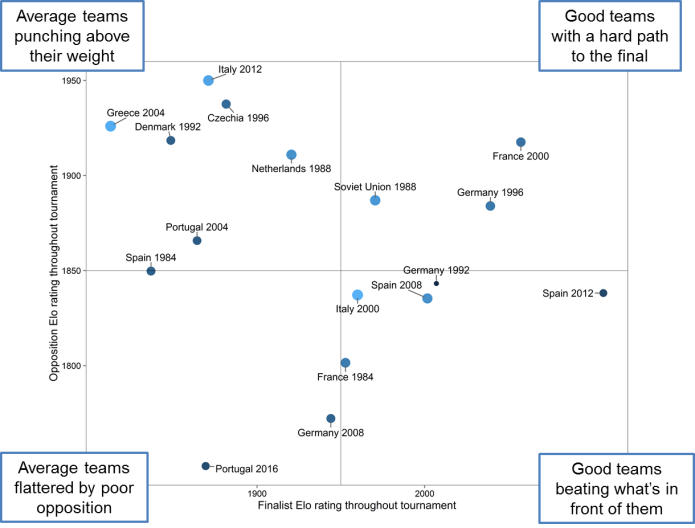I haven’t been impressed with Portugal this tournament (and not just because I’m a bitter Welshman). They haven’t been very good; never really impressing in any of their matches, winning without dominating in the knock outs and held to draws by Iceland and Hungary in the group stages.
I’m pretty sure they’re the worst European Championship finalists I’ve seen, and perhaps the worst ever. But how can you measure how underwhelming a team is?
Step forward Elo ratings. Far better than the joke that is the FIFA rankings, Elo ratings adjust after every single international match based on the teams’ previous Elo ratings. For example, before Iceland and England faced off last week, Iceland had an Elo rating of 1688 and England had an Elo rating of 1929. After Iceland beat England, they exchanged 40 points – Iceland’s Elo rating went up 40 points to 1728, and England’s Elo rating went down 40 points to 1889. This is calculated using the status of the match, the number of goals scored, the result, and the expected result (more on that here, and have a browse of some more examples here).
I’ve taken every finalist (not including the winner of France vs. Germany, which kicks off about an hour from the time of writing) of the Euros since 1984, which was the first tournament where there were knock-out matches (before that, there was a group stage round-robin and the top two teams played off in a final). I’ve calculated each finalist’s mean Elo score throughout the tournament – not including the final itself – as well as calculating the mean Elo score of all the teams they played along the way.
That’s plotted right here:

The dot size and colour shows the difference in each finalist’s Elo score from the start of the tournament until after the semifinal;the larger and lighter the dot, the more the team improved on their way to the final.
France in 2000 are probably the best team to reach a final – not only were they an excellent team at the time, they also beat a lot of strong opposition to get there. Spain in 2012 were the strongest team, but the opposition they faced wasn’t as tough. Greece in 2004 were the weakest team, but they beat some really strong teams along the way, which makes their achievement really impressive.
Portugal this year are dropping off the graph on the bottom left. They aren’t a high quality side – barely better than Greece in 2004 or Denmark in 1992 – but they haven’t been beating any impressive opposition either. They’ve not been that good, and they’ve had the weakest path to the final of any Euros finalist.
So, yes, it looks like my hunch was right – Portugal are the most underwhelming team to reach the final of a European Championship ever since there’s been a proper knock-out round. Sorry, Ronnie.

i am not sure it’s fair to infer that Por2016 are the worst team to have reached the final from them having the weakest run to a final
LikeLike
Sure, Portugal can’t help having had a weak run to the final. But it’s also about Portugal themselves being relatively weak. Germany in 2008 also had a weak run to the final according to the mean Elo score for their opposition, but they were a stronger team.
LikeLike
but a) the measures of their own quality are not independent from their opposition b) what is the argument then to rate them below the teams that were themselves lower rated but got the opportuinity to do what Por2016 did to France more often?
LikeLike
The amount that the Elo rating changes is dependent on the competition, but it’s not like a league where you get three points regardless of winning 1-0 or 8-0. The fact that (until the final) Portugal’s Elo rating barely improved from the first game until the end of the semi final showed that their wins over lower ranked teams weren’t that impressive. For example, they lost 6 Elo points in the penalty win over Poland because it was so close given the disparity in points, whereas Germany gained 15 points in their 3-0 win over Slovakia by comfortably beating a lower-ranked opponent.
It’s definitely not a perfect way of objectively comparing teams across eras, but it does go some way to comparing how well teams have done in the competition.
LikeLike